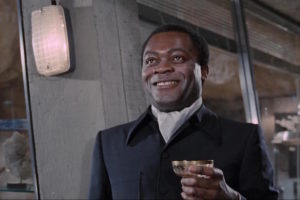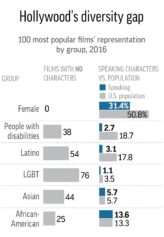
Shortly after Andreeva penned an article criticizing the fact that Black stars were getting roles that weren’t originally written for Black characters, actor Yaphet Kotto is mirroring those sentiments in relation to the upcoming James Bond flick.
Kotto, the actor who played the first and only Black bond villain back in 1973, criticized the idea of a Black man playing James Bond as “silly” because the character was originally written to be a white man.
It’s a shocking statement following the release of emails that revealed former Sony Pictures Entertainment co-chairwoman Amy Pascal advocating for Idris Elba to star as the special agent hero in the upcoming Bond movie, Spectre, slated for a November 2015 release.
There has been a great push for more diversity in Hollywood in recent months, so many were happily welcoming rumors that Sony may be introducing the first Black Bond in their new film.
Kotto, on the other hand, is clearly against the idea.
“James Bond cannot be Black,” Kotto charged in a recent interview with The Big Issue. “Political correctness be damned, we have to stay with what is literally correct.”
According to Kotto, the “literally” correct interpretation of Bond must always be a white man.
“He was established by Ian Fleming as a white character,” he continued. “It’s silly.”
It’s the same type of claim that critics presented when actor Michael B. Jordan was selected to take on the role of the Fantastic Four’s Johnny Storm or when Elba took on the role of Heimdall in Thor: The Dark World.
Kotto’s comments add to a growing list of claims that Black actors should not be allowed to take on “traditionally white” roles even if they were created during a time when racism discouraged writers from coming up with Black characters.
“I don’t think it’s right for Black actors or writers to do roles that whites have made historically white heroic roles,” Kotto continued. “These roles are not written for Black men. Black men should stop trying to play white heroes. We have pens. Put a Black man in a role that no one else has established.”
Of course, Kotto’s suggestion for more Black people to pick up their own pen and write more Black stories ignores the fact that there isn’t actually a shortage of writers who want to tell the stories of authentic Black characters.
What tends to be the case is that Black writers, filmmakers and talent are shut out of Hollywood as distributors turn their backs on them and financial backing becomes nearly impossible to attain.
Racial disparities still plague Hollywood’s landscape even as Black stars have filled a few lead roles on TV.
Kotto’s comments seem to overlook this fact and suggest that Black stars should never have the opportunity to take on the widely popular and hugely profitable superhero franchises that have historically only featured white heroes.

